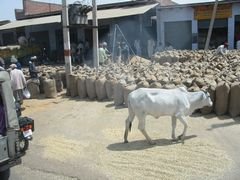Bumper Car Civilization: One Petroleum Powered Car Or Light Truck For Every 6 and 1/2 People On The Planet
"One billion. By 2020 or sooner, that's how many cars and light trucks there will be on the road around the world. That's one for every 6 1/2 people on the planet -- and over 25% more vehicles than we have today....
The auto boom will only add to the congestion in major cities, as well as deepening the world's thirst for petroleum and spewing even more carbon dioxide into the air. That will leave drivers facing rising costs and traffic headaches, and force the auto industry to deal with rising demands for fuel efficiency, pollution control and a host of other rules and regulations. For instance, worried that the European landscape will be littered with junked cars, the European Parliament has demanded that car makers devise ways to recycle and reuse 95% of the weight of a vehicle by 2015.
Longer term, the struggle to accommodate one billion autos on the planet may lead to a rethinking of the car's place in society.
Automobiles have long been symbols of personal freedom. They've enabled people to live in the country and earn better wages in town. Auto makers have enjoyed special status as national industrial champions, protected to some degree from competition in return for providing high-paying jobs on a mass scale....
The view of cars as a symbol of all that's right in the economy and society still holds a lot of power, especially in developing countries. In India, car sales are booming. Auto makers are ramping up production as the government loosens restrictions on foreign auto makers and increases spending on roads to meet the demands of an increasingly affluent middle class. China, meanwhile, is engaged in a massive road-building campaign to accommodate the surge in privately owned vehicles. Chinese auto makers are talking up ambitious plans to crack the U.S. market with their cars within two years....
At the same time, governments and car makers are beginning to demonstrate some concern that too many cars could be too much of a good thing.
In London, the city government has imposed a tax on cars entering the center of the city in an effort to encourage commuters to use mass transit. Other cities around the world are considering similar policies to ease congestion. The impetus for limiting traffic isn't coming just from environmentalists. The Partnership for New York, a business group, has urged the city to consider a congestion tax similar to London's, among other measures, to ease the city's gridlock." ...
Joseph B. White "One Billion Cars" The Wall Street Journal April 17, 2006
http://online.wsj.com/public/article/

Globalization versus Indian Vedic Civilization: The cow is sacred in traditional, Indian Vedic Civilization; while the private automobile is sacred in increasingly larger parts of today's post-traditional, globalized, petroleum-fueled civilization.
Photo credit: http://www.coara.or.jp/~mieko/ With thanks.
The auto boom will only add to the congestion in major cities, as well as deepening the world's thirst for petroleum and spewing even more carbon dioxide into the air. That will leave drivers facing rising costs and traffic headaches, and force the auto industry to deal with rising demands for fuel efficiency, pollution control and a host of other rules and regulations. For instance, worried that the European landscape will be littered with junked cars, the European Parliament has demanded that car makers devise ways to recycle and reuse 95% of the weight of a vehicle by 2015.
Longer term, the struggle to accommodate one billion autos on the planet may lead to a rethinking of the car's place in society.
Automobiles have long been symbols of personal freedom. They've enabled people to live in the country and earn better wages in town. Auto makers have enjoyed special status as national industrial champions, protected to some degree from competition in return for providing high-paying jobs on a mass scale....
The view of cars as a symbol of all that's right in the economy and society still holds a lot of power, especially in developing countries. In India, car sales are booming. Auto makers are ramping up production as the government loosens restrictions on foreign auto makers and increases spending on roads to meet the demands of an increasingly affluent middle class. China, meanwhile, is engaged in a massive road-building campaign to accommodate the surge in privately owned vehicles. Chinese auto makers are talking up ambitious plans to crack the U.S. market with their cars within two years....
At the same time, governments and car makers are beginning to demonstrate some concern that too many cars could be too much of a good thing.
In London, the city government has imposed a tax on cars entering the center of the city in an effort to encourage commuters to use mass transit. Other cities around the world are considering similar policies to ease congestion. The impetus for limiting traffic isn't coming just from environmentalists. The Partnership for New York, a business group, has urged the city to consider a congestion tax similar to London's, among other measures, to ease the city's gridlock." ...
Joseph B. White "One Billion Cars" The Wall Street Journal April 17, 2006
http://online.wsj.com/public/article/

Globalization versus Indian Vedic Civilization: The cow is sacred in traditional, Indian Vedic Civilization; while the private automobile is sacred in increasingly larger parts of today's post-traditional, globalized, petroleum-fueled civilization.
Photo credit: http://www.coara.or.jp/~mieko/ With thanks.


0 Comments:
Post a Comment
<< Home